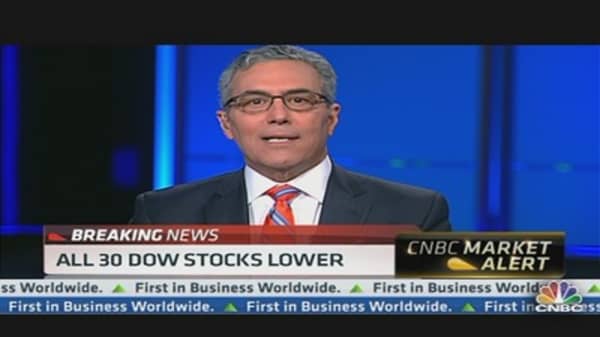Back in 1995, when the the S&P 500 was a mere 513, there was concern of froth. But the market went on to nearly triple to 1,465 in early 2000 before tumbling back to 815 a few years later, rising again to 1,527 in 2008, then plunging below 700 in the financial crisis. Then we had its most recent rally, back to where it is today in the 1,600s.
(Read More: There Will Be Selling: Fed Hints Taper, Markets Bleed)
I had forgotten I had even written the piece until I heard the other day from a reader in Hawaii, who said the "13 commandments," as he calls them, helped make him a millionaire.
We're talking very simple, common sense rules to remember in a market crash like:
- I am a long-term investor and I know the stock market always comes back. I will sleep secure knowing history is on my side.
- I will remember to sell high and buy low. If the market crashes, I will move money from cash equivalents (Treasuries, etc.) into stocks with every 50-point drop in the Dow or five-point drop in the S&P 500. (Do the reverse when the market hits new record highs.) [And remember, those were 1995 benchmarks. Adjust accordingly for 2013.]
- I will make sure anything I buy was hit by the decline. In other words, I won't buy anything that didn't go down, because it probably won't go up. I want to use a big market break to buy quality stocks cheaply.
- I will not read, listen to or believe negative stories during the crash. I know things are never as good as they seem when you're winning, and never as bad as they seem when you're losing. The blessed media will probably be uniformly negative if we have a real barn burner of a crash.
The obvious question: Given the nature of the markets, with high-frequency trading, the emergence of ETFs and an overall different market characteristic than 18 years ago, do the same rules apply today?
(Read More: Global Markets Feel the Fed Sting)
"Yes," was the answer from the three money managers whose advice made up the rules: Kurt Brouwer of Brouwer & Janachowski; Ken Fisher of Fisher Investments and a retired market strategist; and Bob Stovall, who, during my earlier years of writing about stocks and the markets, was always a voice of reason.
But acknowledging the altered markets, Stovall adds: "You have a situation in which all but 20 percent of trades are done automatically. The specialist system is broken or disappeared. You don't have the same type of market structure you had when I was doing this a generation ago.
"So you have to shift gears and accept the new realities and go from there," he said. "But the original theories still hold true."
(Read More: Don't Get Fooled by a Stock's Price)
The big difference, Stovall said, is that unlike a generation ago, "You have to adjust your thinking day-to-day. ... You have to consider that volatility with a big 'V' is a fact of life."
He notes that on average, markets recover from 5 to 10 percent pullbacks within two months; four months for 10 to 20 percent declines, "which isn't that bad, it just feels bad when they're grinding at you."
In his view, that means when the markets get rocky, "You watch the 'fasten the seatbelt sign,' not the 'put on a parachute and assemble by the door' sign."
But having a parachute handy isn't a bad idea, either. Even if you never use it—it's comforting to know it's there.
—By CNBC's Herb Greenberg. Follow him on Twitter: @herbgreenberg and Google
Subscribe to Herb at http://www.facebook.com/herb.greenberg
Questions? Comments? Write to HerbOnTheStreet@cnbc.com
Disclaimer




